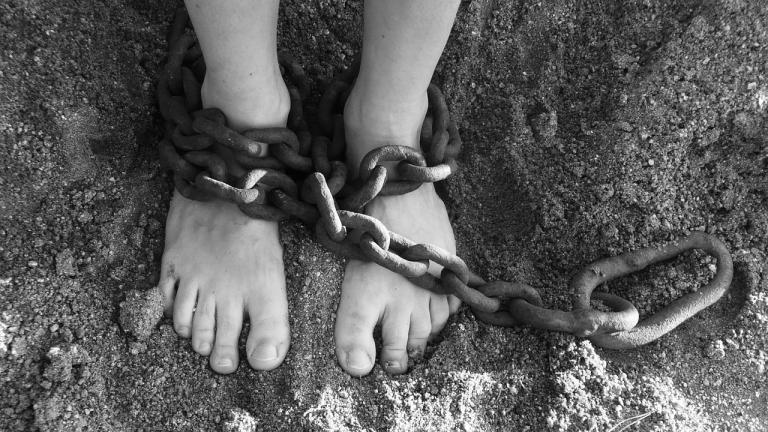Usually I avoid reading Crisis magazine because I think it’s editorial policy is quite literally Luciferian: they spew evil while presenting themselves as the shining defenders of truth and light.
Now, it’s said that you shouldn’t argue with the devil because he is smarter than you and he will always win. Fortunately, Crisis writer Tony Esolen has no such credentials. Although his most recent offering on marriage is chillingly dangerous in application, it’s also desperately poor in argumentation. However it is a type of argument that I bought for many years – and which caused immense suffering to me and more importantly to my children. So I’m going to bother addressing it. (I’m not linking because you should never give the devil clicks — instead I’ve chosen to quote extensively.)
Like many traditionalist Catholics, Esolen rejects the teachings of the Church: specifically the teaching on annulments and the teaching that permits (and in some cases even prescribes) civil divorce in cases of abuse. He likens annulment and civil divorce to a soldier running away from battle:
“I take a common-sense approach to the vow. A young soldier swears to defend the flag of the United States. He does so while knowing nothing of barbed wire and trenches. We hold him to that vow, and do not accept ignorance or immaturity as excuses. In time of war we subject deserters to a court-martial, with the firing squad ready at hand.”
Now, it’s more than a little creepy up front to compare marriage to trench warfare. These two enterprises should be so unlike each other that an analogy can only be drawn when something is really terribly wrong with the marriage.
A war is a great evil which should be avoided whenever possible. A marriage is a great good. One is a descent into hatred and malice. The other is a celebration of love and generosity. One produces only death, the other is meant to produce life.
The fact that trad Christians (Esolen is hardly the first) so often draw analogies between war and marriage should tell us up front that there is something seriously warped about their idea of matrimony. The choice of this particular metaphor reveals that what they are defending is not John Paul II’s idea of a mutual, reciprocal, complementary union in which both spouses give themselves truly and freely to one another. What they are defending is an institution that is founded on violence, force and oppression.
This view calls people, and especially women, to a kind of sacrifice that is actually reckless and negligent.
Why? Because there is one group of people who are always allowed to run away from a war zone. One group of people who are always sent back from the front lines. One group who may never be justly pressed into service.
Children.
One of the primary purposes of marriage is to bring children into the world and provide them with a safe place to grow and flourish. One of the primary purposes of war is to protect civilians, especially children, from violent invaders.
A soldier who finds a group of children huddling in no-man’s land and who leads them out, through the barbed wire, past the trenches, to safety, is not a deserter. He’s a man who truly and deeply understands that war is only justified in so far as its purpose is to protect the vulnerable from aggression. If such a man is court-martialed and shot for leaving the battlefield it is not because he is a coward or a traitor; it is because his superiors have succumbed to battle-lust and quite possibly because their cause was not just in the first place.
When you make marriage all about the keeping of vows and the heroic sacrifices of the couple, you end up erasing the children. Traditional marriage then succumbs to the same solipsism as a child-free tryst: it becomes a self-serving romantic entanglement that is divorced from reality and its responsibilities. Such a marriage is basically a life-long LARP in one person acts out his domination fantasies and the other indulges her masochistic dreams of being martyred for love – but with the rather distressing addition of actual children who are present to feel themselves being marginalized and discounted.
That might sound a little counter-intuitive, especially if you’ve absorbed a lot of trad-Catholic poison about marriage, so let me expand a little. Let’s say that we have a woman who has decided that she is going to keep her marriage vow come hell or high water. The woman in And Never Said a Word, a novel that Esolen references in his article, seems a good choice:
“They are separated. Fred served in the war and it left his spirit in ruins. He tries to scramble up a pitiful living, working as an ill paid telephone operator for the diocese, teaching Latin on the side, and begging for money from old friends and priests. His wife and their three surviving children live in a single room, partitioned from their landlady’s by little more than a curtain and a screen. They cannot live as man and wife there, though the landlord and landlady make their share of amatory noises, which the older children are beginning to notice and to understand. The squalor and the pressure of it all cause Fred one day to snap. He beats the older children, a boy and a girl, though he has never raised a hand against them before.
From that time he has been sleeping elsewhere, homeless. The children long for him to come home, but he is afraid that he will snap again. He gets drunk once or twice a month, he smokes cigarettes, he eats very little, and he saves up a little money for a rendezvous every week with his wife, on a Saturday night, in places that the better class of whores would not endure. Kaete is now pregnant. Every worldly interest instructs them to divorce. They are resigned to it. But they do not do it.”
What effects do this woman’s choices have on her children? On those who endure poverty and are beaten by their dad? On the child who is conceived in a dirty hotel room by a man who has already abandoned his duties as a father and a spouse?
In Esolen’s head, this is an inspiring tale of devotion which we would do well to emulate.
That is seriously creepy. There is only one perspective from which this story looks like a beautiful and inspiring model for conjugal love. That is perspective of the abusive husband whose wife remains devoted to him even though this means enduring poverty, degradation and squalor – not only for herself, but also for her kids.
From any other point of view, this is a tragedy for which the husband bears significant responsibility. He is a deserter, literally. He first beats his children, then blames his violence on the poverty that they are suffering, then uses his violence as an excuse to abandon his wife and kids.
Their poverty is almost certainly exacerbated by Fred’s own messed-up priorities. After he abandons his wife and children this peach of a husband saves up money… not to help feed his children or to get his family out of poverty, but to book squalid hotel rooms so that he can have sex with the woman he abandoned. The man is not only a deserter who fled the battlefield; he still expects to receive a pension for his service.
And his wife, of course, she sees herself as being like Jesus: abused, but silently enduring in love for her abuser.
I haven’t read the book, so I don’t know how Fred presents himself in the novel. But we’ve all heard sob-stories from men who somehow still buy booze and cigarettes even though they “can’t afford” to eat, pay rent or provide child support. In real life, those men don’t only get drunk “once or twice a month” and they aren’t responsible, upstanding non-abusive family men until that one day when suddenly external circumstances are just too much for them.
I also don’t know if the author himself is inviting us to join Fred’s little pity party – or if Esolen just massively missed the point and is buying the lies of a man who the reader is supposed to recognize as an asshole.
In any case, literature is, of course, replete with such stories: stories of long-suffering women who endure every kind of violence and betrayal at the hands of their husbands but who soldier on, making continual sacrifices for the men who mistreat them. Martyrs to the cause of marriage. These women are placed on pedestals and lauded as heroes. Why? For the same reason that we are taught sing the praises of soldiers who sacrificed their lives in needless wars of aggression.
Because powerful men benefit from telling their victims that it is “noble” and “heroic” to lay down their lives in order to advance the interests of powerful men.
This is why I find it especially disgusting when I see a man making this kind of argument.
When women do it, I mostly feel really bad for them. I know what it’s like to internalize the narrative put forth by an abuser. I know what it feels like to find that your domestic life has turned into a battlefield when your boundaries are constantly violated and even the most minor mis-step can cause volleys of abuse to come raining down on your head.
I know the temptation to think of yourself as one of the 300, valiantly holding Thermopylae while all earthly joy is overshadowed by the slings and arrows of your spouse’s unpredictable temper. I get the temptation to feel like you are being strong and protecting your marriage, the desire to hold on in the hopes that one day your love will conquer this violence. I understand why women cleave to the belief that if they just sacrifice longer and harder the war will end and they enjoy domestic peace.
I know the comfort we take in the thought that we are martyrs, like Jesus, and I understand why we come to cling to our martyrdom even as it destroys us. We are afraid, when it comes down to it. Terrified that if we stop cowering in the fortress, if we march out in battle and try to cast down the tyrant from his throne, we will be slaughtered. That trying to make things better will only make them worse.
In the face of such fears, being a martyr gives us the illusion that we have some sort of power. It makes us feel less helpless. It promises us that somehow, mysteriously, our sufferings will be transformed into good. It provides us with day-dreams of a resurrection, a hope that one day our sorrow shall be turned to joy. It reassures us when we see our children suffering that they are suffering for some purpose greater and more meaningful than their father’s temper, sense of entitlement or addiction to booze.
But a man who argues that women are cowards and deserters if they don’t persevere in a marriage that resembles a war-zone? A guy who salivates over the idea of firing squads lined up to punish those who take their kids and flee to safety? That’s a different kind of animal.
He’s not fantasizing about his own martyrdom, romanticizing the great sacrifices that he will make, the virtue and the courage that he will display. He’s dreaming of possessing the kind of woman who puts up with any amount of abuse and degradation and never says a word.
Image by PublicDomainPictures from Pixabay
Stay in touch! Like Catholic Authenticity on Facebook:












